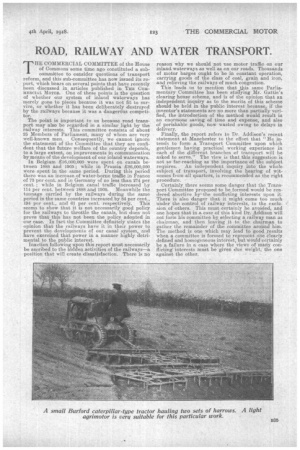ROAD, RAILWAY AND WATER TRANSPORT.
Page 13

If you've noticed an error in this article please click here to report it so we can fix it.
THE COMMERCIAL COMMITTEE of the House of Commons come time ago constituted a subcommittee to consider questions of transport reform, and this sub-committee has now issued its report, which bears on several points that have recently been discussed in articles published in THE COM.iTERCIAL MOTOR.. One of these points is the question of whether our system of inland waterways has merely gone to pieces because it was not fit to survive, or whether it has been deliberately destroyed by the railways because it was a dangertrus competitor.
The point is important to us because road transport may also be regarded in a similar light by the railway interests. This committee consists of about 25 Members of Parliament, many of whom are very well-known men. Consequently, we cannot ignore the statement of the Committee that they are confident that the future welfare of the country depends, to a large extent, on improvements in communication by means of the development of our inland waterways. In Belgium 216,000,000 were spent on canals between 1888 and 1905; while in Prussia £26,000,000 were spent in the same period. During this period there was an increase of water-borne traffic in France of 73 per cent, and in Germany of no less than 274 per cent. ; while in Belgium canal traffic increased Ly 114 per cent. between 1888 and 1905. Meanwhile the • tonnage carried by the railways during the same period in the same countries increased by 84 per cent.,
194 per cent., and 61 per cent. respectively. This seems to show that it is not necessarily good policy for the railways to throttle the canals, but does not prove that this has not been the policy adopted in our case. In fact, the Committee definitely states the opinion that the railways have it in their power to prevent the developments of our canal system, and have exercised that power in a manner highly detrimental to the public interest.
Inaction following upon this report must necessarily be ascribed to the hidden activities of the railways—a position that will create dissatisfaction. There is no reason why we should not use motor traffic on our inland, waterways as well as on our roads. Thousands of motor barges ought to be in constant operation, carrying goods of the class of coal, grain and iron, and relieving the railways of much congestion.
This leads us to mention that this same Parliamentary Committee has been Btu-dying Mr. Gattie's clearing house scheme, and is of the opinion that an independent inquiry as to the merits of this scheme should be held in the public interest because, if the inventor's statements are no more than partially verified, the introduction of the method would result in an enormous saving of time and expense, and also of perishable goods, now wasted owing to delays in delivery.
Finally, the report refers to Dr. Addison's recent statement at Manchester to the effect that " He intends to form a Transport Committee upon which gentlemen having practical working experience in each of the different branches of transport will be asked to serve." The view is that this suggestion is not so far-reaching as the importance of the subject requires. An independent inquiry into the whole subject of transport, involving the hearing of witnesses from all quarters, is recommended as the right procedure.
Certainly there seems some danger that the Transport Committee proposed_ to be_formed would be rendered abortive by the conflicting interests upon it. There is also danger that it might come too much under the control of railway intereits, to the exclusion of others. This must certainly be avoided, and one hopes that in a case of this kind Dr. Addison will not form his committee by selecting a railway man as chairman, and then leaving it to the chairman to gather the remainder of the committee around him. The method is one which may, lead to gond results When a committee is formed to represent one clearly defined and homogeneous interest, but Would certainly be a failure in a case where the Views of niariy conflictinginterests must be given due Weight,' the one against the other.






















